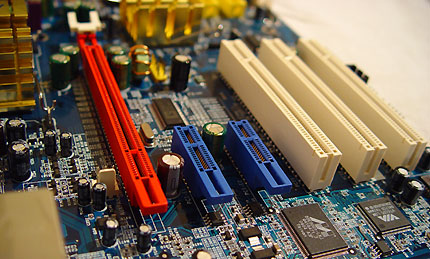Page 2
Huh PCI-Express ?PCI Express is a new development in I/O interconnect standard that companies like ATI and many others will deploy in future graphics solutions. Basically it's going to replace the traditional AGP bus over the next year or two. With up to 4GB/s of one-directional and 8GB/s of concurrent bandwidth, users are free to have high-speed graphics output. PCI Express significantly increases bandwidth between the central processing unit (CPU) and graphics processing unit (GPU). The differences between ATI and NVIDIA (NVIDIA HSI/ATI Native) can be discussed and argued. As far as I'm concerned it just doesn't matter as long as it works properly and performs as expected.

PCI-Express mainboard
The X600 was developed under codename RV380, if you remember our CeBIT 2004 article back in March then you'll see a parallel here, indeed it is the same card. In fact, let me back that up.

ATI's staff holding a X600 (RV380) back in March.
Now then... back in March this product already was massively available... that says something about the architectural design as it likely was not new. The X600 is actually the same old technology ATI has been using for a long time now. In fact you are looking at a slightly altered Radeon 9600 XT.
It's primary features:
- PCI ExpressGraphics Chip
- Native x16 lane PCI Express
- Double the bandwidth of AGP 8X
- Increased memory bandwidth to 12 Gigabytes/sec.
- Four extreme parallel 3D rendering pixel pipelines
- Two programmable vertex shader pipelines
- 128-bit memory interface supporting 128MB or 256MB DDR1 memory configurations
- DirectX® 9 support
Let's place all important stuff compared to the older 9600 model in a table and look at the differences:
| Video cards | Radeon X600 XT PCIE | ATI Radeon 9600 XT AGP |
| Code name | RV380 | RV360 |
| Chip technology | 256 bit | |
| Process technology | 0,13 mkm low-k | |
| Transistors | ~77 mln | ~75 mln |
| Memory bus | 128 bit (DDR) | 128 bit (DDR) |
| AGP bus | PCI-Express x16 | AGP 1x/2x/4x/8x |
| Memory | 128/256 MB | |
| Chip clock speed | 500 MHz | 500 MHz |
| Memory speed | 380 MHz (760 DDR) |
300 MHz (600 DDR) |
| Pixel pipelines | 4 | 4 |
| Textures per pipeline | 1 | 1 |
| Textures per texture unit | 16 | 16 |
| Vertex shader version | 2.0 | 2.0 |
| Pixel shader version | 2.0 | 2.0 |
| DirectX version | 9.0 | |
| Antialiasing modes | Multisampling Maximum 6x |
Multisampling Maximum 6x |
| Anisotropic filtering | 2/4/8/16x | 2/4/8/16x |
| Memory optimization | Hyper Z III+ | Hyper Z III+ |
| Optimizations | SmartShader 2.0 SmoothVision 2.1 |
SmartShader 2.0 SmoothVision 2.1 |
| Q-ty of monitor outputs | 2 | |
| Integrated RAMDAC | 2 x 400 MHz | |
As you can see, the x600 is a 100% refresh product of the older 9600. There is nothing very new from that point of view.
